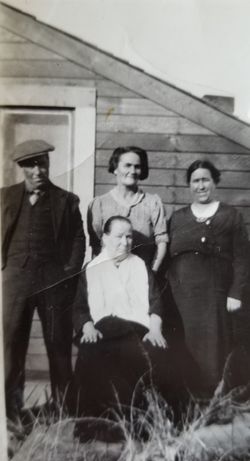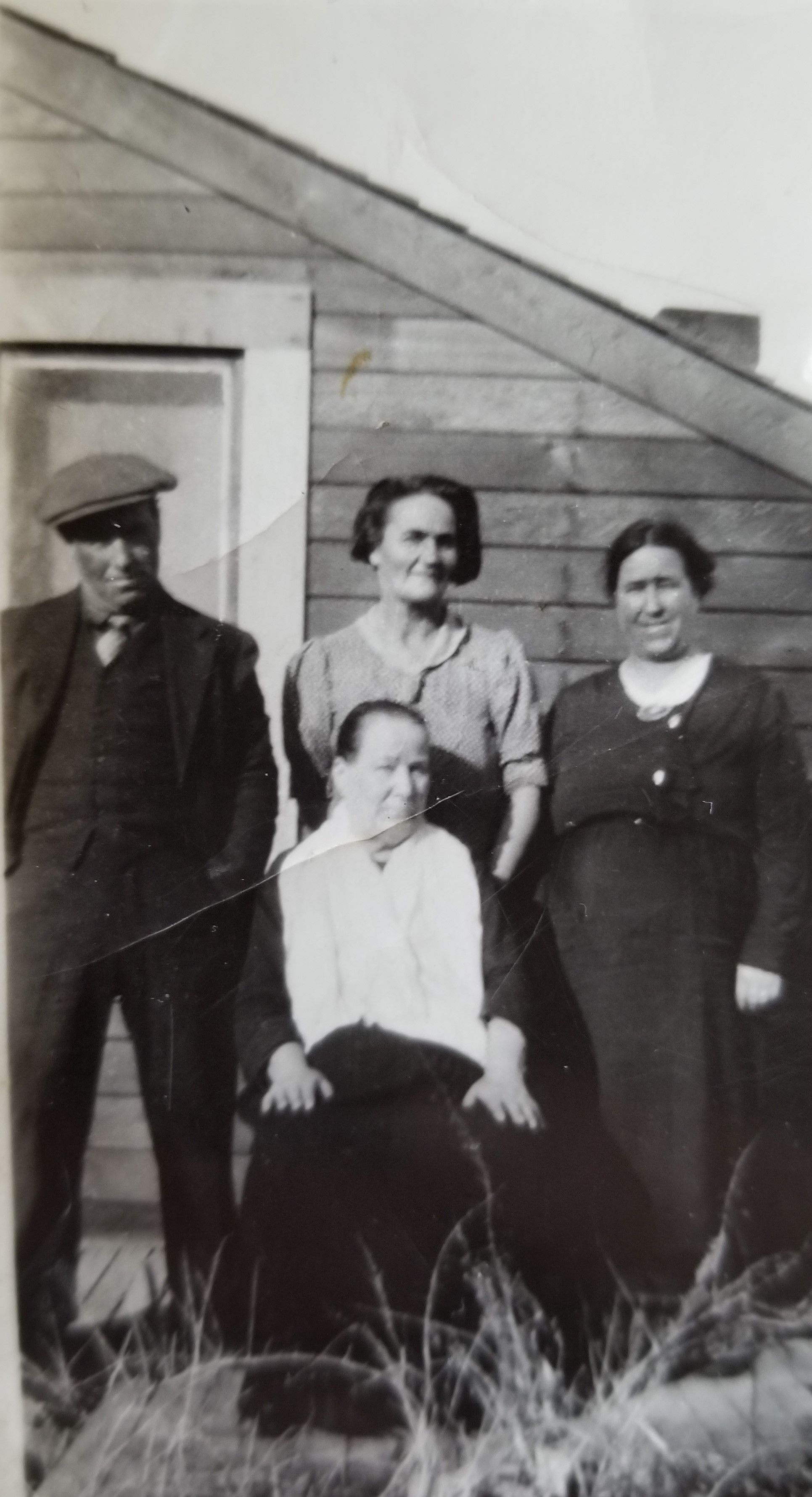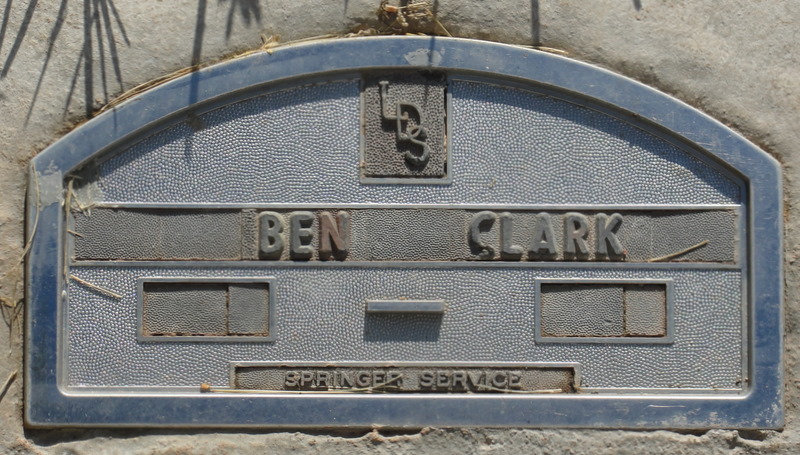Married Mary Hughes, 8 March 1862, Salt Lake City, Salt Lake, Utah
Married Mary Ellen Bullard, 5 December 1877, St George, WashingUtah
A Sketch of the Life of Benjamin Clark (dictated to Ellen Clark Mangum, his daughter)
I was born in Cambridge, Cambrideshire, England, February 2, 1836. I was the youngest son, the ninth child, of the family of Benjamin Thomas Clark and Ann Shuker. There were 12 children in my family.
In 1851, I joined the Church of Jesus Christ of Latter-day Saints, at the age of 15 years. I was converted and baptized by Elders Joseph Johnson and George Wallace of Salt Lake City, Utah.
After the death of my mother (24 June 1948), my father married a widow, Ann Southwell Seymour with 1 son.
I left my native country Dec. 2, 1852, with my father, stepmother, and 13 members of our family to get to Zion in the Valley of the Mountains. We entered Salt Lake City, October 6, 1853. I was re-baptized shortly after by H. Wiles, Conference President, and confirmed by Bishop H.O. Smoot. I was also ordained a Seventy by President Jacob Gates in the fall of 1856; and a High Priest in the year of 1894 by L.R. Forsyth.
I went with a team to assist those who were coming to Utah with the Handcart train in the year of 1856. Also I went out to Echo Canyon in the Army to defend the rights of this people against Johnston's Army. The following spring, I went with my fathers family during a move to the south, settling in Provo, Utah.
I married my first wife, Mary Hughes, in the Endowment House on May 16, 1858. We went to the states of Montana and California in 1862. I moved with my wife to Cache Valley in 1865. Because of my wife's ill health, we moved to Pine Valley, Washington County in the summer of 1876. My wife died in March, 1877.
I married my second wife, Mary Ellen Bullard, daughter of Ezra Nelson Bullard and Mary Harriet Burgess, on December 4, 1877 in the St. George Temple. In the fall of 1879, I was called to help settle the South. I settled in Thurber, Utah. I was called to be the first Superintendent of the Sunday School for our Ward in the spring of 1880, which office I held until August 1893. I was released with thanks for the work I had done.
(The following is written by his daughter, Ellen.)
His first wife Mary, had no children. Her sister gave two of her youngest children, Sam and Sarah Legg, to my father and Aunt Mary. They raised them until they were grown. After Aunt Mary died, Sarah soon married and Sam lived with them.
For twelve years, my father used to gather all the children from ranches near the road and take them to Sunday School with him. He was Superintendent of the Sunday School at that time. He had no schooling, could neither read or write. He had a wonderful memory. He could sing all the old songs and could preach a lovely sermon. After he and mother were married, she taught hin the letters, so he was able to read the Book of Mormon.
He was always faithful and true to the church and paid a full tithing. One time I asked him if I could go up the canyon after Sunday School with the girls my age. He said, “No, not today, tomorrow or any day during the week you can have the team and take all the girls you can load in the wagon box. Take your lunch and have a good time, but never on Sunday.”
He loved his family very dearly and he wanted us to live good lives as he always lived. He never worked on Sunday. He had poor health several years before he died. I was the oldest of the children so I helped him with the farm work. We made dobies and built two more rooms on our home. This was the last work he ever did, they weren't finished, but we could live in them.
He loved to fish and hunt ducks. Both were very plentiful in that valley. (Rabbit Valley). He made a big seine, with which we often caught a tub full of lovely trout in one pull. It was a thrill to see so many fish all jumping at once. We threw the small ones back in the stream. He also fished with a ptich fork. Old Ring, his dog, got in the stream below and caught all the fish that got off the tines and brought them back to father. Us kids sure got a kick out of that. He gave lots of ducks and fish to his neighbors and never wasted anything. He butchered pigs, and built chimneys for nearly all the people that lived in Thurber.
When the railroad came to Utah, President Brigham Young made arrangements with the men for the young men to work on the railroad and the older men to do the farming. My father was one of those young men. He said they took their washing to the Chinese laundries in Corinne, and they would darn the their garments where they didn't need darned. They had a terrible time getting them undone.
I was 15 years old when father died, on May 23 1894 leaving mother with seven children.
Note by Marilyn Scott Dahneke, great granddaughter, written 16 September 2015: I find it very interesting that Benjamin Thomas Clark could neither read nor write until his second wife taught him. His father, Thomas Benjamin Clark, was a very literate man and kept a diary of their trip from England to the Gulf of Mexico as they were immigrating to the United States to join with the saints in Utah.
Married Mary Hughes, 8 March 1862, Salt Lake City, Salt Lake, Utah
Married Mary Ellen Bullard, 5 December 1877, St George, WashingUtah
A Sketch of the Life of Benjamin Clark (dictated to Ellen Clark Mangum, his daughter)
I was born in Cambridge, Cambrideshire, England, February 2, 1836. I was the youngest son, the ninth child, of the family of Benjamin Thomas Clark and Ann Shuker. There were 12 children in my family.
In 1851, I joined the Church of Jesus Christ of Latter-day Saints, at the age of 15 years. I was converted and baptized by Elders Joseph Johnson and George Wallace of Salt Lake City, Utah.
After the death of my mother (24 June 1948), my father married a widow, Ann Southwell Seymour with 1 son.
I left my native country Dec. 2, 1852, with my father, stepmother, and 13 members of our family to get to Zion in the Valley of the Mountains. We entered Salt Lake City, October 6, 1853. I was re-baptized shortly after by H. Wiles, Conference President, and confirmed by Bishop H.O. Smoot. I was also ordained a Seventy by President Jacob Gates in the fall of 1856; and a High Priest in the year of 1894 by L.R. Forsyth.
I went with a team to assist those who were coming to Utah with the Handcart train in the year of 1856. Also I went out to Echo Canyon in the Army to defend the rights of this people against Johnston's Army. The following spring, I went with my fathers family during a move to the south, settling in Provo, Utah.
I married my first wife, Mary Hughes, in the Endowment House on May 16, 1858. We went to the states of Montana and California in 1862. I moved with my wife to Cache Valley in 1865. Because of my wife's ill health, we moved to Pine Valley, Washington County in the summer of 1876. My wife died in March, 1877.
I married my second wife, Mary Ellen Bullard, daughter of Ezra Nelson Bullard and Mary Harriet Burgess, on December 4, 1877 in the St. George Temple. In the fall of 1879, I was called to help settle the South. I settled in Thurber, Utah. I was called to be the first Superintendent of the Sunday School for our Ward in the spring of 1880, which office I held until August 1893. I was released with thanks for the work I had done.
(The following is written by his daughter, Ellen.)
His first wife Mary, had no children. Her sister gave two of her youngest children, Sam and Sarah Legg, to my father and Aunt Mary. They raised them until they were grown. After Aunt Mary died, Sarah soon married and Sam lived with them.
For twelve years, my father used to gather all the children from ranches near the road and take them to Sunday School with him. He was Superintendent of the Sunday School at that time. He had no schooling, could neither read or write. He had a wonderful memory. He could sing all the old songs and could preach a lovely sermon. After he and mother were married, she taught hin the letters, so he was able to read the Book of Mormon.
He was always faithful and true to the church and paid a full tithing. One time I asked him if I could go up the canyon after Sunday School with the girls my age. He said, “No, not today, tomorrow or any day during the week you can have the team and take all the girls you can load in the wagon box. Take your lunch and have a good time, but never on Sunday.”
He loved his family very dearly and he wanted us to live good lives as he always lived. He never worked on Sunday. He had poor health several years before he died. I was the oldest of the children so I helped him with the farm work. We made dobies and built two more rooms on our home. This was the last work he ever did, they weren't finished, but we could live in them.
He loved to fish and hunt ducks. Both were very plentiful in that valley. (Rabbit Valley). He made a big seine, with which we often caught a tub full of lovely trout in one pull. It was a thrill to see so many fish all jumping at once. We threw the small ones back in the stream. He also fished with a ptich fork. Old Ring, his dog, got in the stream below and caught all the fish that got off the tines and brought them back to father. Us kids sure got a kick out of that. He gave lots of ducks and fish to his neighbors and never wasted anything. He butchered pigs, and built chimneys for nearly all the people that lived in Thurber.
When the railroad came to Utah, President Brigham Young made arrangements with the men for the young men to work on the railroad and the older men to do the farming. My father was one of those young men. He said they took their washing to the Chinese laundries in Corinne, and they would darn the their garments where they didn't need darned. They had a terrible time getting them undone.
I was 15 years old when father died, on May 23 1894 leaving mother with seven children.
Note by Marilyn Scott Dahneke, great granddaughter, written 16 September 2015: I find it very interesting that Benjamin Thomas Clark could neither read nor write until his second wife taught him. His father, Thomas Benjamin Clark, was a very literate man and kept a diary of their trip from England to the Gulf of Mexico as they were immigrating to the United States to join with the saints in Utah.
Gravesite Details
Marker no Information
Family Members
Advertisement
Records on Ancestry
Advertisement




















